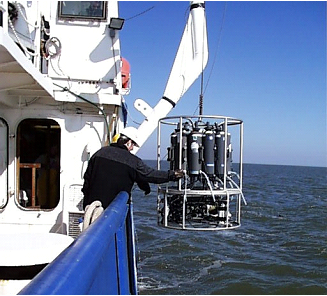Scientists’ use of simulation models has increased during the past several decades as a widely accepted tool for investigations into estuarine dynamics. A recently published scientific review paper, authored by NCCOS-sponsored scientists,outlines the progress and accomplishments of coupled hydrodynamic-ecological estuarine modeling. ManyNCCOS-sponsored foundational modeling studies are featured in the review paper.
Findings showthat while most models require scientific expertise to operate, the trend is a more user-friendly model that can be used bymanagers and stakeholders and that includes scenario analysis capabilities(“what if” situations). Users would like a shared ownership of the model that allows independent operation. Models are also being used in all levels of classrooms as educational tools, especially in Science, Technology, Engineering and Math (STEM) courses. NCCOS research contributes to the advancement of these useful models and supports the user-friendly applicationsencouraged by the review paper.

The article concludes with seven recommendations:
- While the modeling trend moves towards increased resolution and complexity, economical models of intermediate complexity become more usefultostakeholders and educators;
- Modelers evaluate and test models against theory and observations, rather than relying on other models as truth;
- Next generation training for researchers include cross-disciplinary training and skill development in both observational and modeling techniques;
- Funding resources directed to develop and maintain long-term, spatially comprehensive observational databases using accepted data standards;
- Increased development of ensemblemodels that includevarying spatiotemporal resolution and ecological/biogeochemical complexity where relevant for management and education uses;
- Researchers aim to translate state-of-the-art models into user-accessible, decision-support tools for managers and other stakeholders as appropriate;
- Models integrated into educational activities to increase the public’s fluency in modeling and serve as a recruiting tool for students into STEM fields.
Some of the important papers cited in the paper derived from NCCOS sponsored research projects are:
Project: Scenarios and Tradeoffs: Providing Useful Models to Coastal Managers
- Sediment Flux Modeling: Calibration and Application for Coastal Systems
- Sediment Flux Modeling: Simulating Nitrogen, Phosphorus, and Silica Cycles
- Skill Assessment for Coupled Biological/Physical Models of Marine Systems
Project: Integrated Ecosystem Modeling of the Causes of Hypoxia
- Assessing Biophysical Controls on Gulf of Mexico Hypoxia Through Probabilistic Modeling
- A Scenario and Forecast Model for Gulf of Mexico Hypoxic Area and Volume
- Predicting Summer Hypoxia in the Northern Gulf of Mexico: Riverine N, P, and Si Loading
Project: Modeling Hypoxia and Ecological Responses to Climate and Nutrients
- Nutrient Budgets and Management Actions in the Patuxent River Estuary, Maryland
- Quantifying the Effects of Nutrient Loading on Dissolved O2 Cycling and Hypoxia in Chesapeake Bay Using a Coupled Hydrodynamic-Biogeochemical Model
Project: Observations and Modeling of Narragansett Bay Hypoxia and its Response to Nutrient Management
- Introduction to the special issue of Ecological Modelling: ‘Advances in Modeling Estuarine and Coastal Ecosystems: Approaches, Validation, and Applications’
- Modeling the Role of Macroalgae in a Shallow Sub-Estuary of Narragansett Bay, RI (USA)
- A Coupled Physical-Biological Model of the Northern Gulf of Mexico Shelf: Model Description, Validation and Analysis of Phytoplankton Variability
- Multivariable Statistical Regression Models of the Areal Extent of Hypoxia over the Texas-Louisiana Continental Shelf
Project: EcoCheck: NOAA and University of Maryland Center for Environmental Science Partnership
- Chesapeake Bay Summer Forecast: 2014
For more information, contact Rob Magnien.
